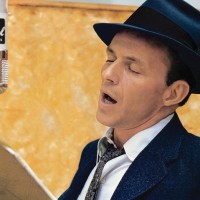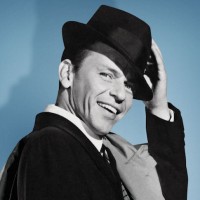Trilogy, presented as an “event” in 1980 when Frank Sinatra sessions began slowing to a crawl, finds him attempting to frame the past, present and future on a trio of discs. It’s an ultimately flawed release — but not without its saving graces.
Then nearing the end of his recording career, Sinatra was to be commended, I guess, for attempting something like the concluding album’s free-form “Reflections on the Future in Three Tenses” — even if arranger Gordon Jenkins’ sides ended up being overly didactic and, really, entirely dispensable. Frank Sinatra’s middle record here, helmed by Don Costa and focusing on the present, included contemporary 1970s songs like “Song Sung Blue,” “MacArthur Park” and “Just the Way You Are,” and was largely forgettable, too.
Stick with the old stuff: Arranger Billy May (a rumpled and formerly legendary boozer) fashioned a sensitive, even supple set of charts on Disc 1 — his first collaboration on strings with Sinatra since 1957’s remarkable Come Fly With Me.
Called “The Past,” it’s dotted with several now-familiar songs that, at this point, the then-64-year-old Sinatra hadn’t tackled before. There’s a deeper coloring both to his phrasing and May’s once-blazing brass on tracks like Gershwin’s “But Not For Me” and “They All Laughed”; Gus Kahn’s “It Had to Be You,” Cole Porter’s “All of You,” the lost 1929 hit “More than You Know.”
He and May also make spirited runs through a few tunes that Frank Sinatra had already added similar dimension to in concert as he grew older, including his early hit “The Song Is You” and “Street of Dreams” — which Sinatra had memorably interpreted during his live mid-1960s recording with the Count Basie Orchestra. Beats me how the brilliant May (who worked with Glenn Miller, Bing Crosby, Stan Freeberg and George Shearing; and originally arranged “Cherokee,” a swing classic widely considered a key inspiration for bop) has somehow remained underrated. Equally adept as driving rhythms as he was with a ballad orchestration, May was as off-handed as he was unique. He incorporated drums in a way that more celebrated Sinatra collaborators like Jenkins and Nelson Riddle never did.
Then there’s the legend of Billy May writing charts for the Come Fly With Me sessions — which included definitive versions of both “Moonlight in Vermont” (relaxed and plush, it’s a nice preview of how “The Past” would so perfectly match strings with Sinatra’s enduring ear for phrasing) and “April in Paris” (a series of thoroughly enjoyable emotional crescendos) — even while working on Freeberg’s half-hour radio show earlier that afternoon. Back then, May might down a half a fifth of scotch — he quit drinking in 1964 — while conducting, but he never missed a beat.
That loose, swinging attitude ultimately saved a too-cute set that (despite having produced “New York, New York,” which appeared on Costa’s middle record) has become infamous for devolving from the sublime into the ridiculous and then the utterly bizarre: We find a cut on “The Future” featuring the lady who did those caterwauling vocals during the title sequence of TV’s Star Trek. Who wants a Frank Sinatra CD with something called “Conclusion: Song Without Words”?
May showcased, with simple grace, why the past still mattered. This is, at least on Disc 1, enduring American art — modern yet thoroughly free of the dated, “high-concept” missteps that doomed the rest of Trilogy. Frank Sinatra would enter a recording studio again only a handful of times over the next 15 years. None produced more timeless results than this.
- The Band’s ‘Christmas Must Be Tonight’ Remains an Unjustly Overlooked Holiday Classic - December 25, 2016
- Nick DeRiso’s Best of 2015 (Rock + Pop): Death Cab for Cutie, Joe Jackson, Toto + Others - January 18, 2016
- Nick DeRiso’s Best of 2015 (Blues, Jazz + R&B): Boz Scaggs, Gavin Harrison, Alabama Shakes - January 10, 2016




